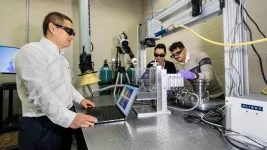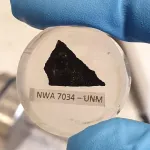(Press-News.org) University of Wisconsin–Madison engineers have found a way to simultaneously mitigate three types of defects in parts produced using a prominent additive manufacturing technique called laser powder bed fusion.
Led by Lianyi Chen, an associate professor of mechanical engineering at UW–Madison, the team discovered the mechanisms and identified the processing conditions that can lead to this significant reduction in defects. The researchers detailed their findings in a paper published on November 16, 2024, in the International Journal of Machine Tools and Manufacture.
“Previous research has normally focused on reducing one type of defect, but that would require the usage of other techniques to mitigate the remaining types of defects,” Chen says. “Based on the mechanisms we discovered, we developed an approach that can mitigate all the defects — pores, rough surfaces and large spatters — at once. In addition, our approach allows us to produce a part much faster without any quality compromises.”
Multiple industries, including aerospace, medical and energy, are increasingly interested in using additive manufacturing, also known as 3D printing, to produce metal parts with complex shapes that are difficult or impossible to create using conventional methods.
But the big challenge is that metal parts created with additive manufacturing have defects — like pores, or “voids,” rough surfaces and large spatters — that significantly compromise the finished part’s reliability and durability. These quality problems prevent 3D-printed parts from being used for critical applications where failure is not an option.
By providing a path for simultaneously increasing part quality and manufacturing productivity, the UW–Madison team’s advance could lead to widespread industry adoption of laser powder bed fusion.
Laser powder bed fusion uses a high-energy laser beam to melt and fuse thin layers of metal powder, constructing a part layer by layer from the bottom up. In this research, the UW–Madison team used an innovative ring-shaped laser beam, provided by a leading laser company called nLight, instead of the usual Gaussian-shaped beam.
The ring-shaped laser beam played a key role in this breakthrough — as did critical “in-situ” experiments, says Jiandong Yuan, the lead author of the paper and a PhD student in Chen’s group.
To see how the material behaved within the part as it was printing, researchers went to the Advanced Photon Source, an ultra-bright, high-energy synchrotron X-ray user facility at Argonne National Laboratory. Combining high-speed synchrotron X-ray imaging, theoretical analysis and numerical simulation, the researchers revealed the defect mitigation mechanisms, which involve phenomena that reduce instabilities in the laser powder bed fusion process.
The researchers also demonstrated that they could use the ring-shaped beam to drill deeper into the material without causing instabilities in the process. This enabled them to print thicker layers, increasing the manufacturing productivity. “Because we understood the underlying mechanisms, we could more quickly identify the right processing conditions to produce high-quality parts using the ring-shaped beam,” says Chen.
Lianyi Chen is the Kuo K. & Cindy F. Wang Associate Professor of mechanical engineering.
Collaborators from UW-Madison include Qilin Guo, Luis Escano, Ali Nabba, Minglei Qu, Junye Huang, Qingyuan Li, Allen Jonathan Román, and Professor Tim Osswald. Samuel Clark and Kamel Fezzaa from Argonne National Laboratory also collaborated on this project.
This work was supported by the National Science Foundation and the Wisconsin Alumni Research Foundation.
# # #
--Adam Malecek, acmalecek@wisc.ed
END
3D-printing advance mitigates three defects simultaneously for failure-free metal parts
2024-11-22
ELSE PRESS RELEASES FROM THIS DATE:
Ancient hot water on Mars points to habitable past: Curtin study
2024-11-22
New Curtin University-led research has uncovered what may be the oldest direct evidence of ancient hot water activity on Mars, revealing the planet may have been habitable at some point in its past.
The study analysed a 4.45 billion-year-old zircon grain from the famous Martian meteorite NWA7034, also known as Black Beauty, and found geochemical ‘fingerprints’ of water-rich fluids.
Study co-author Dr Aaron Cavosie from Curtin’s School of Earth and Planetary Sciences said the discovery opened up new avenues for understanding ancient Martian hydrothermal systems associated ...
In Patagonia, more snow could protect glaciers from melt — but only if we curb greenhouse gas emissions soon
2024-11-22
In an era of dwindling glaciers, Southern Patagonia has managed to hold on to a surprising amount of its ice. But, A new study in Scientific Reports from INSTAAR postdoc Matthias Troch suggests that this protective effect might be pushed up against its limits soon.
Before making predictions, Troch and his collaborators looked back in time. They used an equation that, when plugged into NASA’s ice-sheet and sea-level system model, simulated glacial dynamics for the past six millenia. The results showed that precipitation, not temperature, was the main culprit of glacier fluctuation during around 4,500, of the past 6,000 years, or 76 percent of the time. In ...
Simplicity is key to understanding and achieving goals
2024-11-22
People’s preference for simple explanations of any situation is connected to their desire to execute tasks efficiently, finds a new study from the University of Waterloo.
"These findings show that our preference for simpler explanations mirrors how we evaluate actions. Simplicity isn't just valued in explanations—it's part of how we think about achieving results efficiently," said Claudia Sehl, lead author and a PhD candidate in developmental psychology at Waterloo.
Sehl collaborated with Waterloo developmental psychology professors Ori Friedman and Stephanie Denison on this study. They conducted seven experiments involving 2,820 ...
Caste differentiation in ants
2024-11-22
Most ants have two morphologically differentiated adult castes - queens and workers - each irreversibly specialized for either reproduction or nonreproductive altruism such as foraging, defense and care of maternal brood. Adult gynes (virgin queens) normally have higher body mass, wings and frontal eyes, as well as enlarged ovaries and a sperm storage organ. In contrast, workers are wingless females with smaller body size and degenerated reproductive tracts, usually without a sperm storage organ. In 1910, the American entomologist ...
Nutrition that aligns with guidelines during pregnancy may be associated with better infant growth outcomes, NIH study finds
2024-11-22
Expectant mothers who maintain a diet that meets USDA dietary guidelines during pregnancy may be more likely to have infants with healthy birthweights, steadier growth patterns, and potentially a reduced risk of obesity later in childhood, according to a new study funded by the Environmental influences on Child Health Outcomes (ECHO) Program at the National Institutes of Health.
The research, involving more than 2,800 mother-child pairs across eight ECHO Cohort Study Sites, suggests that following a healthy ...
New technology points to unexpected uses for snoRNA
2024-11-22
Dynamic, reversible modifications of DNA and RNA regulate how genes are expressed and transcribed, which can influence cellular processes, disease development, and overall organismal health. Small nucleolar RNAs (snoRNAs) are a common but overlooked group of guide RNA molecules that steer chemical modifications to cellular ribosomal RNA (rRNA) targets, like an usher showing someone to their seat in a theater.
Researchers from the University of Chicago recently developed a new approach for identifying new cellular RNA targets of snoRNAs. ...
Racial and ethnic variation in survival in early-onset colorectal cancer
2024-11-22
About The Study: In this cohort study, racial and ethnic disparities in early-onset (before 50 years of age) colorectal cancer mortality were evident, with the highest burden among Native Hawaiian or Other Pacific Islander and non-Hispanic Black individuals. These results provide evidence of the role of social determinants of health in explaining these differences.
Corresponding Author: To contact the corresponding author, Maria Elena Martinez, PhD, email e8martinez@health.ucsd.edu.
To access the embargoed study: Visit our For The Media website at this link https://media.jamanetwork.com/
(doi:10.1001/jamanetworkopen.2024.46820)
Editor’s Note: Please ...
Disparities by race and urbanicity in online health care facility reviews
2024-11-22
About The Study: This serial cross-sectional study observed a significant decrease in positive reviews for health care facilities post-COVID. These findings underscore a disparity in patient experience, particularly in rural areas and areas with the highest proportions of Black and white residents.
Corresponding Author: To contact the corresponding author, Neil K. R. Sehgal, ME, email neilsehgal99@gmail.com.
To access the embargoed study: Visit our For The Media website at this link https://media.jamanetwork.com/
(doi:10.1001/jamanetworkopen.2024.46890)
Editor’s Note: Please see the article for ...
Exploring factors affecting workers' acquisition of exercise habits using machine learning approaches
2024-11-22
Tsukuba, Japan—Physical inactivity is the fourth leading mortality risk factor, following hypertension, smoking, and hyperglycemia. Therefore, acquiring an exercise habit is crucial to maintain and improve health. In Japan, Specific Health Guidance is provided to support the improvement of lifestyle habits, including exercise habits. To develop more efficient health guidance, it is important to identify factors that influence its effectiveness (e.g., characteristics and lifestyle of the target ...
Nano-patterned copper oxide sensor for ultra-low hydrogen detection
2024-11-22
Hydrogen is becoming an increasingly popular choice as we shift towards cleaner energy. It can be burned like traditional fuels, producing only water as a byproduct, and can generate electricity when used in fuel cells. However, as hydrogen production, use, and transportation increase, so do safety concerns. Hydrogen is highly flammable at concentrations as low as 4% and is odorless and colorless, making leaks challenging to detect.
To address these concerns, researchers led by Professor Yutaka Majima from Institute of Science Tokyo (Science Tokyo) have developed a sensor that detects hydrogen at ultra-low concentrations ...



